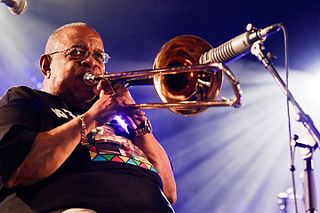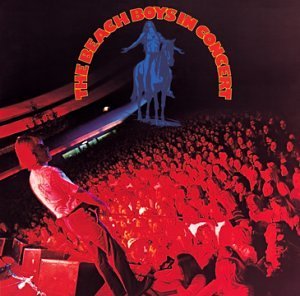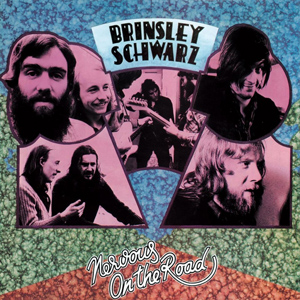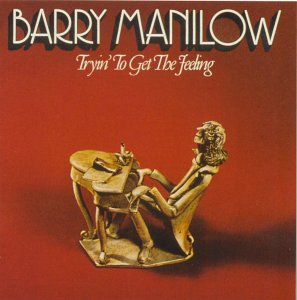
A metronome, from ancient Greek μέτρον and νέμω, is a device that produces an audible click or other sound at a regular interval that can be set by the user, typically in beats per minute (BPM). Musicians use the device to practise playing to a regular pulse. Metronomes typically include synchronized visual motion.
A click track is a series of audio cues used to synchronize sound recordings, sometimes for synchronization to a moving image. The click track originated in early sound movies, where optical marks were made on the film to indicate precise timings for musical accompaniment. It can also serve a purpose similar to a metronome, as in the music industry, where it is often used during recording sessions and live performances.

Peter William Brockbanks, known professionally as Peter Banks, was an English guitarist, vocalist, songwriter and producer. He was best known as the original guitarist in the rock bands the Syn, Yes, Flash, and Empire. Former Sniffin' Glue and NME journalist Danny Baker described Banks as "the architect of progressive music".

Time Out of Mind is the 30th studio album by American musician Bob Dylan, released on September 30, 1997, through Columbia Records. It was released as a single CD as well as a double studio album on vinyl, his first since Self Portrait in 1970.

The J.B.'s was the name of James Brown's band from 1970 through the early 1980s. On records the band was sometimes billed under alternate names such as Fred Wesley and the JBs, The James Brown Soul Train, Maceo and the Macks, A.A.B.B., Fred Wesley and the New JBs, The First Family, and The Last Word. In addition to backing Brown, the J.B.'s played behind Bobby Byrd, Lyn Collins, and other singers associated with the James Brown Revue, and performed and recorded as a self-contained group. In 2015, they were nominated for induction into the Rock and Roll Hall of Fame but failed to be inducted and can be considered for Musical Excellence in the future. They have been eligible since 1995.

Bessie Regina Norris, better known by her stage name Betty Wright, was an American soul and R&B singer, songwriter and background vocalist. Beginning her professional career in the late 1960s as a teenager, Wright rose to fame in the 1970s with hits such as "Clean Up Woman" and "Tonight Is the Night". Wright was also prominent in her use of whistle register.
Blaze is a house-music group formed in 1984 in New Jersey, USA.

The Beach Boys in Concert is the third live album released by the U.S. pop group The Beach Boys. It was released in late 1973. In the U.S. the live album was their first live album since Beach Boys Concert released nine years earlier. Their second, Live in London, was released in the UK in 1970, but was not released in the U.S. until 1976. The Beach Boys in Concert gave the band their best chart peak since 1967's Wild Honey by reaching number 25, and earning them their first gold record since 1966's Best of The Beach Boys. The album is now available on a single-disc CD.

Nervous on the Road is a pub rock album by Brinsley Schwarz, released in 1972.
Ultimate Breaks and Beats was a series of 25 compilation albums released from 1986 to 1991 by Street Beat Records edited by "BreakBeat Lou" Flores. Featured on the albums were tracks from 1966 to 1984 that included drum breaks.

Tryin' to Get the Feeling is the third studio album by singer-songwriter Barry Manilow, released in 1975. It featured the title track, "Tryin' to Get the Feeling Again", with other hits including "New York City Rhythm", "Bandstand Boogie" and the chart topping "I Write the Songs". The album debuted on the Billboard Top 200 Chart on November 8, 1975, reaching number five in early 1976. The album was certified double platinum.

Barry Manilow Live is the fifth album by the singer-songwriter Barry Manilow. The album was released in 1977, and it scored quadruple platinum.

About Time is the eighth solo studio album by Steve Winwood, released in 2003. It was his first album since 1997 and it featured a return to a musical style more in line with his earlier work with Traffic. That basic style is emphasized in the three piece set of the band: Hammond Organ, guitar and drums/percussion, joined on various tracks by saxophone, flute and additional percussion characteristic of the Traffic sound.
Timothy E. Thomas is an American R&B singer, keyboardist, songwriter and record producer, best known for the hit song, "Why Can't We Live Together".
"Cold Sweat" is a song performed by James Brown and written with his bandleader Alfred "Pee Wee" Ellis. Brown recorded it in May 1967. An edited version of "Cold Sweat" released as a two-part single on King Records was a No. 1 R&B hit, and reached number seven on the Pop Singles chart. The complete recording, over 7 minutes long, was included on an album of the same name.
"Why Can't We Live Together" is a song by Timmy Thomas from the album Why Can't We Live Together. The song is notable for being recorded in mono; its sparse, stripped-down production, features a Lowrey organ, bossa nova-style percussion from an early rhythm machine, and Thomas's passionate, soulful vocal. Thomas recorded a demo at Dukoff Recording Studios in North Miami, Florida, with Bill Borkan acting as sound engineer. The single version got more airplay because the longer instrumental coda was considered by many radio stations to be closer to jazz. This song is in a form of a Blues couplet, with the first two lines repeated. This song simply gives an antiwar message. The Timmy Thomas version begins it's verses in F Minor, ending in C Major, with the High C note being repeated during the instrumental interlude, without the Organ chords being played. The song begins with 2 instrumental verses, followed by the instrumental interlude, before Timmy Thomas sings the verses at 1 Minute and 45 Seconds into the song.

Billboard Top R&B Hits is a series of compilation albums released by Rhino Records in 1990 with each volume featuring ten hit rhythm and blues recordings from the 1970s. All tracks on the album were hits on the Billboard Best Selling Soul Singles chart with many also achieving success on the Billboard Hot 100 pop chart.

Whale Meat Again is the second studio album by the British musician Jim Capaldi, released by Island Records in 1974. Like his first solo album, it failed commercially in his native United Kingdom but did better in the United States. With help from the opening track, "It's All Right", which spent seven weeks in the Billboard Hot 100 and peaked at number 55, the album reached number 191 in the Billboard 200.
If We Make It Through December is the sixteenth studio album by American country singer Merle Haggard and The Strangers, released in 1974. It reached number 4 on the Billboard country album charts. The title track was previously released on Haggard's Christmas release of 1973, A Christmas Present. The single spent four weeks at No. 1 on the Billboard magazine Hot Country Singles chart in December 1973 and January 1974, and cracked the Top 30 of the Billboard Hot 100. "If We Make It Through December" was the No. 2 song of the year on Billboard's Hot Country Singles 1974 year-end chart.
Discography of The Spencer Davis Group.












